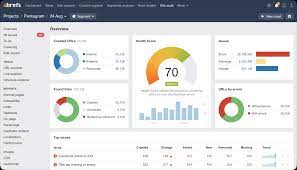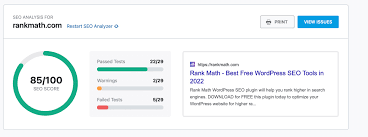SEO Analyzer: Unleashing the Power of Data for Enhanced Online Visibility
In today’s digital landscape, having a strong online presence is crucial for businesses to thrive. Search Engine Optimization (SEO) plays a pivotal role in improving your website’s visibility and driving organic traffic. To achieve optimal results, it is essential to understand the intricacies of your website’s performance and identify areas for improvement. This is where an SEO analyzer comes into play.
What is an SEO Analyzer?
An SEO analyzer is a powerful tool that provides valuable insights into your website’s overall health and performance. It analyzes various aspects of your site, such as on-page optimization, backlinks, keyword usage, site speed, mobile-friendliness, and more. By examining these factors, an SEO analyzer helps you identify issues that may be hindering your website’s ranking on search engine results pages (SERPs).
The Benefits of Using an SEO Analyzer
- Comprehensive Website Audit: An SEO analyzer conducts a thorough audit of your website, highlighting both strengths and weaknesses. It examines critical elements like meta tags, headings, content quality, image optimization, and URL structure. By identifying areas that require attention or improvement, you can enhance the overall user experience and increase the chances of ranking higher in search results.
- Keyword Analysis: Keywords are the foundation of any successful SEO strategy. An SEO analyzer helps you analyze keyword usage on your website by providing insights into keyword density and relevance. It also suggests alternative keywords that can potentially drive more targeted traffic to your site.
- Backlink Analysis: Backlinks are crucial for establishing authority and credibility in the eyes of search engines. An SEO analyzer evaluates the quality and quantity of backlinks pointing to your site. It identifies potentially harmful links that may be negatively impacting your rankings and suggests strategies for acquiring high-quality backlinks.
- Competitor Analysis: Understanding what your competitors are doing can give you a competitive edge in the digital landscape. An SEO analyzer allows you to analyze your competitors’ websites, uncovering their strategies and identifying areas where you can outperform them. This information can help you refine your own SEO approach and stay ahead in the race.
- Performance Tracking: An SEO analyzer provides regular reports on your website’s performance metrics, such as organic traffic, bounce rate, and average session duration. By monitoring these metrics over time, you can gauge the effectiveness of your SEO efforts and make data-driven decisions to optimize your website further.
Choosing the Right SEO Analyzer
With numerous SEO analyzers available in the market, it is crucial to select one that suits your specific needs. Consider factors such as ease of use, comprehensiveness of analysis, reporting capabilities, and customer support when making your decision. Some popular options include Moz, SEMrush, Ahrefs, and Google Search Console.
Conclusion
In the ever-evolving world of digital marketing, leveraging data is key to achieving online success. An SEO analyzer empowers businesses by providing valuable insights into their website’s performance and offering actionable recommendations for improvement. By harnessing the power of an SEO analyzer, you can optimize your website for search engines, enhance user experience, and drive targeted organic traffic to achieve greater online visibility.
Common Questions About SEO Analyzers: Explained and Answered
- What is an SEO analyzer and what does it do?
- How can an SEO analyzer help improve my website’s search engine rankings?
- Which SEO analyzer tool is the best for my website?
- What are the key features to look for in an SEO analyzer?
- Can an SEO analyzer help me identify and fix technical issues on my website?
- Is it necessary to have technical knowledge or expertise to use an SEO analyzer effectively?
What is an SEO analyzer and what does it do?
An SEO analyzer is a tool or software that evaluates various aspects of a website’s performance and provides insights into its search engine optimization (SEO) effectiveness. It examines different factors that influence a website’s visibility on search engine results pages (SERPs) and helps identify areas for improvement.
Here are some key functions and features of an SEO analyzer:
- On-Page Analysis: An SEO analyzer assesses on-page elements such as meta tags, headings, content quality, keyword usage, URL structure, and internal linking. It identifies issues or optimizations needed to improve the website’s relevance and visibility to search engines.
- Keyword Analysis: Keywords play a vital role in SEO. An SEO analyzer analyzes keyword usage throughout the website, including in titles, headings, content, and meta tags. It provides insights into keyword density, relevance, and suggests alternative keywords that can enhance the website’s visibility for specific search queries.
- Backlink Evaluation: Backlinks are important for building authority and credibility. An SEO analyzer examines the quality and quantity of backlinks pointing to a website. It helps identify potentially harmful or low-quality links that may negatively impact rankings and suggests strategies for acquiring high-quality backlinks.
- Technical Audit: A comprehensive SEO analysis includes technical aspects such as site speed, mobile-friendliness, crawlability, indexing issues, XML sitemap presence, and more. An SEO analyzer checks these technical factors to ensure optimal website performance from an SEO perspective.
- Competitor Analysis: Understanding competitors’ strategies can provide valuable insights for improving your own SEO efforts. An SEO analyzer allows you to analyze competitors’ websites by evaluating their keywords, backlinks profiles, rankings data, content strategies, and more.
- Performance Tracking: An SEO analyzer provides reports on key performance metrics like organic traffic, rankings for target keywords, bounce rate, average session duration, etc. These reports help monitor progress over time and make data-driven decisions to optimize the website further.
By utilizing an SEO analyzer, businesses and website owners can gain valuable insights into their website’s SEO performance and uncover opportunities for improvement. It helps optimize various aspects of a website to enhance its visibility, attract targeted organic traffic, and improve search engine rankings.
How can an SEO analyzer help improve my website’s search engine rankings?
An SEO analyzer can play a crucial role in improving your website’s search engine rankings by providing valuable insights and recommendations. Here are some ways an SEO analyzer can help:
- On-Page Optimization: An SEO analyzer examines various on-page factors, such as meta tags, headings, content quality, keyword usage, and URL structure. It identifies areas where optimization is needed and suggests improvements to make your website more search engine-friendly. By implementing these recommendations, you can enhance the relevance and visibility of your web pages.
- Keyword Analysis: Keywords are the foundation of SEO. An SEO analyzer helps you analyze keyword usage on your website by providing insights into keyword density, relevance, and alternative keyword suggestions. By optimizing your content with relevant keywords that align with user search intent, you increase the likelihood of ranking higher in search results.
- Backlink Analysis: Backlinks are an essential factor in search engine rankings. An SEO analyzer evaluates the quality and quantity of backlinks pointing to your site. It identifies potentially harmful links that may be negatively impacting your rankings and suggests strategies for acquiring high-quality backlinks from authoritative sources.
- Technical Optimization: Search engines consider technical aspects like site speed, mobile-friendliness, and crawlability when determining rankings. An SEO analyzer helps identify technical issues that may be affecting your website’s performance and provides recommendations for improvement. By addressing these technical factors, you enhance user experience and increase the chances of ranking higher in search results.
- Competitor Analysis: Understanding what your competitors are doing can give you valuable insights into their strategies and help you identify areas for improvement on your own website. An SEO analyzer allows you to analyze your competitors’ websites, uncovering their strengths and weaknesses in terms of SEO practices. This information enables you to refine your own strategy and outperform them in search engine rankings.
- Performance Tracking: An SEO analyzer provides regular reports on key performance metrics like organic traffic, bounce rate, and average session duration. By monitoring these metrics over time, you can assess the impact of your SEO efforts and make data-driven decisions to optimize your website further.
By utilizing the insights and recommendations provided by an SEO analyzer, you can make informed optimizations to your website, improve its search engine visibility, and ultimately increase your chances of ranking higher in search engine results pages (SERPs).
Which SEO analyzer tool is the best for my website?
Choosing the best SEO analyzer tool for your website depends on various factors, including your specific needs, budget, and level of expertise. Here are a few popular SEO analyzer tools that are widely regarded as effective:
- Moz: Moz offers a comprehensive suite of SEO tools, including their Site Crawl feature, which provides in-depth insights into your website’s health and identifies areas for improvement. It also offers keyword research, backlink analysis, and rank tracking capabilities.
- SEMrush: SEMrush is a versatile SEO tool that offers a wide range of features to analyze and optimize your website. It provides detailed site audits, competitor analysis, keyword research, and backlink analysis. SEMrush also offers additional features like content optimization suggestions and social media management tools.
- Ahrefs: Ahrefs is known for its robust backlink analysis capabilities. It provides detailed insights into your website’s backlink profile and helps you identify opportunities to improve your link building strategy. Ahrefs also includes features like site audits, keyword research, rank tracking, and content explorer.
- Google Search Console: Google Search Console is a free tool provided by Google that allows you to monitor and optimize your website’s presence in Google search results. It provides valuable data on search performance, indexing status, mobile usability, and more.
Ultimately, the best SEO analyzer tool for your website will depend on your specific requirements and preferences. Consider factors such as the depth of analysis required, budget constraints, ease of use, reporting capabilities, and customer support when making your decision. It may be helpful to try out different tools through their free trials or demos to determine which one aligns best with your needs before committing to a paid subscription.
What are the key features to look for in an SEO analyzer?
When choosing an SEO analyzer, it’s important to consider several key features that can greatly impact the effectiveness and usability of the tool. Here are some essential features to look for:
- Site Audit: A comprehensive site audit feature is crucial for identifying technical issues that may affect your website’s SEO performance. Look for an SEO analyzer that can analyze factors like meta tags, headings, URL structure, duplicate content, broken links, page speed, mobile-friendliness, and more.
- Keyword Analysis: Effective keyword research is essential for optimizing your website’s content. Look for an SEO analyzer that provides in-depth keyword analysis, including keyword suggestions, search volume data, competition analysis, and insights into keyword usage on your website.
- Backlink Analysis: Backlinks play a vital role in SEO. An SEO analyzer should offer a backlink analysis feature to evaluate the quality and quantity of backlinks pointing to your site. It should identify potentially harmful links and provide insights into your link profile.
- Competitor Analysis: Understanding what your competitors are doing can help you refine your own SEO strategy. Look for an SEO analyzer that allows you to analyze competitor websites and compare their performance metrics with yours. This feature can provide valuable insights into their strategies and help you identify opportunities for improvement.
- Reporting and Analytics: An effective SEO analyzer should provide detailed reports on various metrics like organic traffic, keyword rankings, backlink profile, site health score, and more. Look for a tool that offers customizable reporting options and easy-to-understand visualizations to track progress over time.
- User-Friendly Interface: The usability of the tool is essential for efficient workflow management. Look for an intuitive interface with clear navigation and organized data presentation. The tool should be user-friendly even for those without advanced technical knowledge.
- Integration with Other Tools: Consider whether the SEO analyzer integrates with other tools or platforms you use in your digital marketing efforts. Integration with tools like Google Analytics, Google Search Console, and social media platforms can provide a more comprehensive analysis of your website’s performance.
- Customer Support: Reliable customer support is crucial when using any software tool. Look for an SEO analyzer that offers responsive customer support channels such as email, live chat, or phone support. It’s also helpful to check if they provide documentation, tutorials, or a knowledge base to assist users.
By considering these key features, you can choose an SEO analyzer that suits your specific needs and helps you optimize your website effectively for improved search engine visibility and organic traffic.
Can an SEO analyzer help me identify and fix technical issues on my website?
Yes, an SEO analyzer can certainly help you identify and fix technical issues on your website. Technical issues can have a significant impact on your website’s performance and its ability to rank well in search engine results. An SEO analyzer typically scans your website for various technical factors, including:
- Site Speed: Slow-loading websites can lead to higher bounce rates and lower search engine rankings. An SEO analyzer can identify areas where your site may be experiencing speed-related issues and provide recommendations for improvement.
- Mobile-Friendliness: With the majority of internet users accessing websites through mobile devices, having a mobile-friendly site is crucial. An SEO analyzer can assess how well your website performs on mobile devices and highlight any areas that need attention for better mobile optimization.
- URL Structure: Proper URL structure is essential for search engines to understand the content of your web pages. An SEO analyzer can analyze your URLs and provide suggestions to optimize them for better search engine visibility.
- XML Sitemap: A sitemap helps search engines crawl and index your website effectively. An SEO analyzer can check if you have a sitemap in place and ensure it is correctly formatted and submitted to search engines.
- Duplicate Content: Duplicate content can negatively impact your website’s rankings. An SEO analyzer can detect instances of duplicate content on your site and provide recommendations on how to resolve them.
- Broken Links: Broken links not only create a poor user experience but also affect search engine crawling and indexing. An SEO analyzer can scan your website for broken links, allowing you to fix them promptly.
- SSL Certificate: Having an SSL certificate is essential for securing user data and improving trustworthiness in the eyes of both users and search engines. An SEO analyzer can check if your site has an SSL certificate installed correctly.
By using an SEO analyzer, you can gain valuable insights into these technical aspects of your website and receive actionable recommendations on how to address any identified issues. This can help you optimize your website’s technical performance, improve user experience, and enhance your search engine rankings.
Is it necessary to have technical knowledge or expertise to use an SEO analyzer effectively?
While having technical knowledge or expertise can certainly be beneficial when using an SEO analyzer, it is not always necessary. Many SEO analyzers are designed to be user-friendly and accessible to users with varying levels of technical proficiency.
Most SEO analyzers provide clear and intuitive interfaces that guide users through the analysis process. They often offer explanations and recommendations in plain language, making it easier for non-technical users to understand the findings and implement suggested improvements.
However, having a basic understanding of SEO principles can help you interpret the results more effectively and make informed decisions. It’s helpful to have some knowledge of concepts such as on-page optimization, keyword research, backlink analysis, and website performance metrics. This knowledge will enable you to better understand the insights provided by the SEO analyzer and take appropriate action.
If you are new to SEO or lack technical expertise, it can be worthwhile to educate yourself on fundamental SEO concepts through online resources, tutorials, or courses. This will equip you with a solid foundation and enhance your ability to use an SEO analyzer effectively.
Additionally, many SEO analyzers offer documentation or customer support channels where you can seek assistance if you encounter any difficulties or have questions about using the tool. Taking advantage of these resources can help bridge any gaps in your technical knowledge and ensure that you are making the most of the SEO analyzer’s capabilities.
In summary, while technical knowledge is not always necessary to use an SEO analyzer effectively, having a basic understanding of SEO concepts will enhance your ability to interpret the results and implement recommended improvements. Additionally, utilizing available documentation and support channels can help address any specific technical questions or challenges that may arise during the analysis process.




